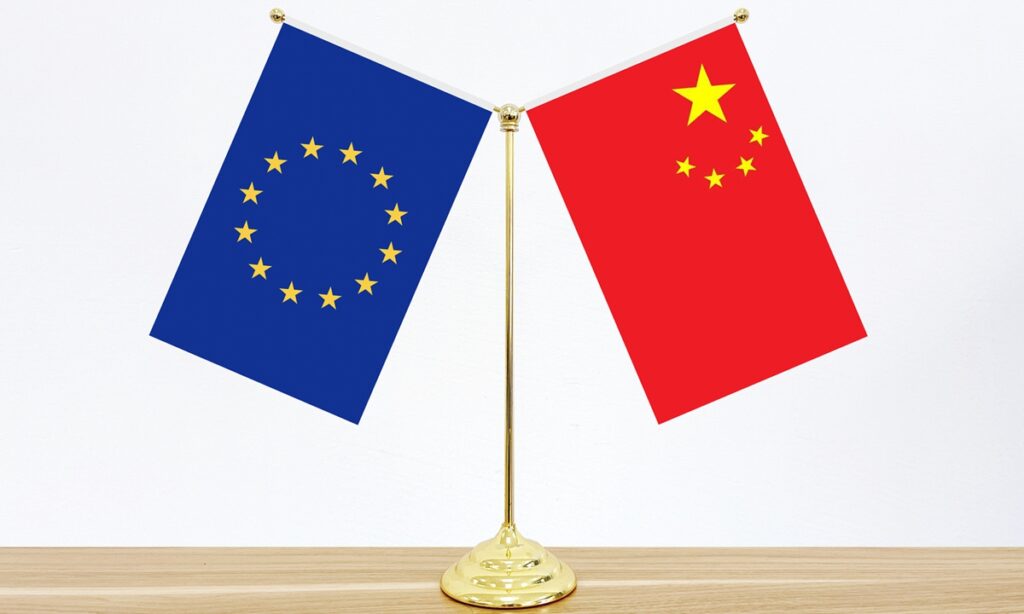China and the EU are expected to seek more exchanges, clear away some mistrust and mend spats under Brussels’ “de-risking” approach ahead of the China-EU summit, Chinese experts said on Saturday, after an EU official confirmed that the EU foreign policy chief Josep Borrell will head to China next week, after previously postponing the trip twice.
An EU official, who has not been named, disclosed on Friday that EU’s top diplomat will visit China from October 12 to 14, according to AFP. Borrell will meet Chinese Foreign Minister Wang Yi “to discuss bilateral relations as well as foreign policy and security issues,” according to the EU official.
The possible visit comes after Brussels started a probe into China’s “electric vehicles subsidies,” which China’s Ministry of Commerce expressed strong dissatisfaction and firm opposition to on Wednesday.
Brussels’ approach of “balancing” its concerns over relying too much on Beijing while maintaining ties will likely be at the heart of Borrell’s upcoming discussions with Chinese officials, according to the AFP.
Wang Yi, also a member of the Political Bureau of the Communist Party of China (CPC) Central Committee, welcomed Borrell’s attendance of the strategic dialogue during their phone call in August. Analysts believe that during his Beijing visit, Borrell aims to attend the China-EU Strategic Dialogue, one of the three pillars of China-EU relations, and prepare for the China-EU summit.
Li Haidong, a professor at the China Foreign Affairs University, told the Global Times that the focus of Borrell’s visit is likely to be on strategic communication and cooperation, clearing the way for promoting exchanges in various fields such as the economy, energy and people-to-people exchanges, and increasing trust on issues of mutual concern.
Despite its desire for more autonomy in economic matters, the EU has been kidnapped by the US on security issues and has had to take into account the strategic competition between the US and China, which Europe also has broad and deep common interests with, Li said.
China hopes that by promoting strategic coordination and cooperation with the EU, Europe will become more powerful and influential on the global stage, so that the global strategic pattern will be more balanced, instead of Europe being held hostage by the US, Li said. “That’s a goal shared by China and Europe.”
China hopes to work together with the EU to maintain the stability of relations and address the challenges together, Cui Hongjian, a professor with the Academy of Regional and Global Governance with Beijing Foreign Studies University, told the Global Times.
The full resumption of in-person exchanges between China and the EU started only in the first half of 2023, and the EU’s misunderstanding and negative sentiments on China need to be gradually eased, according to Cui.
On September 25, Chinese and EU officials held a high-level economic and trade dialogue in person in Beijing for the first time since the pandemic, with a series of new agreements in various areas reached. On Tuesday, the European Parliament approved a new trade instrument to enable the EU to respond to “economic blackmail” from a foreign country, which could be used by China hawks against Beijing.
The mixed and self-contradictory moves and signals from EU reflected the mentality under the “de-risking” approach taken by Ursula von der Leyen, president of the European Commission, analysts believed.
China will also express its concerns, said Cui, as although “de-risking” is different from the US’ “decoupling,” the unilateral narrative has not been accepted by the Chinese side.
According to Cui, China hopes the EU will further clarify the concept of “de-risking”: does it regard China as a risk, or does it regard the problems faced by China and Europe as a risk? “Regarding China as a risk is not the proper way to treat a strategic partner.”
“China-EU relations should have a principle and a main tone, rather than being divided into ‘cooperation, competition and confrontation,’ which will never lead to a balance… it’s possible that some areas of cooperation will be drawn into the track of competition or even confrontation, when the EU is exaggerating ‘security’ in a one-sided way,” said an expert.
Dealing with the probe into “electric vehicles subsidies” could be a litmus test, said Cui. “If the two sides can resolve the issue through technological and political consultations, it will not only resolve economic frictions, but also enhance political mutual trust. But if some European politicians want to change EU’s China policy traditions or just flex muscles, China-EU ties could remain unstable for a while.”
(Global Times)




